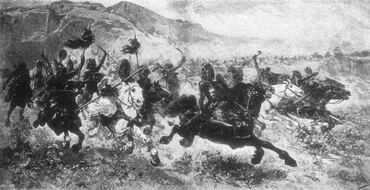1
Palabra que vino a Jeremías del SEÑOR, (cuando Nabucodonosor rey de Babilonia, y todo su ejército, y todos los reinos de la tierra del señorío de su mano, y todos los pueblos, peleaban contra Jerusalén, y contra todas sus ciudades), diciendo:
2
Así dijo el SEÑOR Dios de Israel: Ve, y habla a Sedequías rey de Judá, y dile: Así dijo el SEÑOR: He aquí que yo entrego esta ciudad en mano del rey de Babilonia, y la abrasaré con fuego;
3
y no escaparás tú de su mano, sino que de cierto serás preso, y en su mano serás entregado; y tus ojos verán los ojos del rey de Babilonia, y te hablará boca a boca, y en Babilonia entrarás.
4
Con todo eso, oye palabra del SEÑOR, Sedequías rey de Judá: Así dijo el SEÑOR de ti: No morirás a cuchillo;
5
en paz morirás, y conforme a las quemas de tus padres, los reyes primeros que fueron antes de ti, así quemarán por ti, y te endecharán diciendo : ¡Ay, señor!; porque yo hablé la palabra, dijo el señor.
6
Y habló Jeremías profeta a Sedequías rey de Judá todas estas palabras en Jerusalén.
7
Y el ejército del rey de Babilonia peleaba contra Jerusalén, y contra todas las ciudades de Judá que habían quedado, contra Laquis, y contra Azeca; porque de las ciudades fuertes de Judá éstas habían quedado.
8
Palabra que vino a Jeremías del SEÑOR, después que el rey Sedequías hizo concierto con todo el pueblo en Jerusalén, para promulgarles libertad;
9
que cada uno dejase su siervo, y cada uno su sierva, hebreo y hebrea, libres; que ninguno usase de los judíos sus hermanos como de siervos.
10
Y cuando oyeron todos los príncipes, y todo el pueblo que había convenido en el pacto de dejar cada uno su siervo y cada uno su sierva libres, que ninguno usase más de ellos como de siervos, escucharon, y los dejaron.
11
Pero después se arrepintieron, e hicieron tornar los siervos y las siervas que habían dejado libres, y los sujetaron por siervos y por siervas.
12
Y vino palabra del SEÑOR a Jeremías, diciendo:
13
Así dice el SEÑOR Dios de Israel: Yo hice Pacto con vuestros padres el día que los saqué de tierra de Egipto, de casa de siervos, diciendo:
14
Al cabo de siete años dejaréis cada uno a su hermano hebreo que te fuere vendido; te servirá pues seis años, y lo enviarás libre de ti; mas vuestros padres no me oyeron, ni inclinaron su oído.
15
Y vosotros os habíais hoy convertido, y hecho lo recto delante de mis ojos, anunciando cada uno libertad a su prójimo; y habíais hecho pacto en mi presencia, en la Casa sobre la cual es llamado mi nombre.
16
Pero os tornasteis y contaminasteis mi nombre, y tornasteis a tomar cada uno su siervo y cada uno su sierva, que habíais dejado libres a su voluntad; y los sujetasteis para que os sean siervos y siervas.
17
Por tanto, así dijo el SEÑOR: Vosotros no me oísteis a mí en promulgar cada uno libertad a su hermano, y cada uno a su compañero: he aquí que yo os promulgo libertad, dijo el SEÑOR, a cuchillo y a pestilencia, y a hambre; y os pondré en remoción a todos los reinos de la tierra.
18
Y entregaré a los hombres que traspasaron mi Pacto, que no hicieron firmes las palabras del Pacto que celebraron en mi presencia, dividiendo en dos partes el becerro y pasando por medio de ellas;
19
a los príncipes de Judá y a los príncipes de Jerusalén, a los eunucos y a los sacerdotes, y a todo el pueblo de la tierra, que pasaron entre las partes del becerro,
20
los entregaré en mano de sus enemigos y en mano de los que buscan su alma; y sus cuerpos muertos serán para comida de las aves del cielo, y de las bestias de la tierra.
21
Y a Sedequías rey de Judá, y a sus príncipes, entregaré en mano de sus enemigos, y en mano de los que buscan su alma, y en mano del ejército del rey de Babilonia, que se fueron de vosotros.
22
He aquí, que yo mando, dijo el SEÑOR, y los haré volver a esta ciudad, y pelearán contra ella, y la tomarán, y la abrasarán a fuego; y daré las ciudades de Judá a soledad, hasta no quedar morador.







